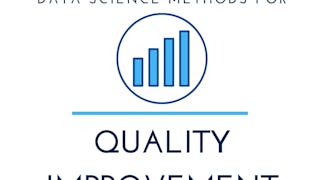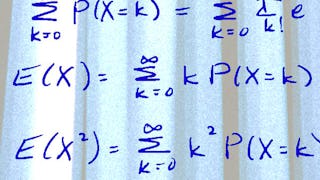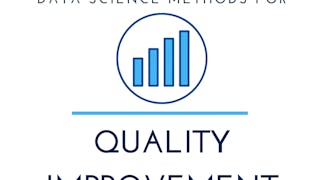In this course, you will learn to analyze measurement systems for process stability and capability and why having a stable measurement process is imperative prior to performing any statistical analysis. You will analyze continuous measurement systems and statistically characterize both accuracy and precision using R software. You will perform measurement systems analysis for potential, short-term and long-term statistical control and capability. Additionally, you will learn how to assess a discrete measurement and perform analyses for internal consistency, concordance between assessors, and concordance with a standard. Finally, you will learn how to make decisions on measurement systems process improvement.



Measurement Systems Analysis
This course is part of Data Science Methods for Quality Improvement Specialization

Instructor: Wendy Martin
Included with 
Recommended experience
What you'll learn
Understand the terms and concepts associated with measurement systems analysis
Analyze measurement error to determine the potential capability of a measurement system
Analyze measurement error to determine the short-term and long-term capability of a measurement system
Analyze a measurement system for discrete data using potential, short-term, and long-term studies
Details to know

Add to your LinkedIn profile
7 assignments
See how employees at top companies are mastering in-demand skills

Build your subject-matter expertise
- Learn new concepts from industry experts
- Gain a foundational understanding of a subject or tool
- Develop job-relevant skills with hands-on projects
- Earn a shareable career certificate


Earn a career certificate
Add this credential to your LinkedIn profile, resume, or CV
Share it on social media and in your performance review

There are 5 modules in this course
In this module, we will learn to identify, characterize and analyze relationships between two variables. We will first learn about correlation between two continuous variables and tests for significance. Next, we will learn about correlation for ordinal variables, and association for one nominal and one continuous variable. Finally, we will learn to assess relationship for two nominal variables.
What's included
9 videos2 readings1 assignment2 discussion prompts
In this module, we will perform an Analysis of Variance for Fixed and Random Effects for a single factor and interpret results. We will first examine within versus between-group variation, and interpret the ANOVA source table. We will learn how to perform the ANOVA with Fixed Effects for means and dispersion, considering normality and equal/unequal variance. We'll create data visualizations of results, calculate statistical importance and perform post hoc analysis. Finally, we'll perform the ANOVA with Random Effects.
What's included
15 videos2 assignments1 discussion prompt
In this module, we will understand the terms and concepts associated with measurement systems analysis and analyze measurement error to determine the potential capability of a measurement system. We will explore the guidelines for measurement systems analyses and the equations for measurement error and capability. We will then calculate the sources of variation from the ANOVA determine the largest sources of variation, and determine capability in comparison to both process variation and specification tolerance. Finally, we'll create data visualizations, and interpret the results of the analysis.
What's included
11 videos1 assignment1 discussion prompt
In this module, we will analyze measurement error to determine the short and long-term capability of a measurement system. We will build on what we have learned in the previous module, adding the evaluation of the underlying assumptions of normality, independence of part size/magnitude and measurement error, and stability of measurement error. We'll perform an ANOVA to determine sources of variation along with the determination of gauge discrimination. Finally, we'll create data visualizations, and interpret the results of the analysis.
What's included
7 videos2 assignments1 discussion prompt
In this module, we will analyze a discrete measurement system to determine agreement, consistency, and validity. We will first familiarize ourselves with the terms, definitions, and procedures associated with Discrete Measurement Systems Analysis. Next, we will explore the measurement of agreement using the Kappa statistic and the measure of disagreement using the test of symmetry. We will then learn to perform analyses for concordance with two appraisers and two categories, two appraisers more than two categories, and more than two appraisers. We will analyze appraisers for internal consistency. Finally, we'll assess validity (concordance with a standard).
What's included
14 videos1 assignment1 discussion prompt
Instructor

Offered by
Explore more from Probability and Statistics


University of Colorado Boulder


Unilever


University of Colorado Boulder


University of Colorado Boulder
Build toward a degree
Why people choose Coursera for their career




New to Probability and Statistics? Start here.

Open new doors with Coursera Plus
Unlimited access to 10,000+ world-class courses, hands-on projects, and job-ready certificate programs - all included in your subscription
Advance your career with an online degree
Earn a degree from world-class universities - 100% online
Join over 3,400 global companies that choose Coursera for Business
Upskill your employees to excel in the digital economy
Frequently asked questions
Access to lectures and assignments depends on your type of enrollment. If you take a course in audit mode, you will be able to see most course materials for free. To access graded assignments and to earn a Certificate, you will need to purchase the Certificate experience, during or after your audit. If you don't see the audit option:
The course may not offer an audit option. You can try a Free Trial instead, or apply for Financial Aid.
The course may offer 'Full Course, No Certificate' instead. This option lets you see all course materials, submit required assessments, and get a final grade. This also means that you will not be able to purchase a Certificate experience.
When you enroll in the course, you get access to all of the courses in the Specialization, and you earn a certificate when you complete the work. Your electronic Certificate will be added to your Accomplishments page - from there, you can print your Certificate or add it to your LinkedIn profile. If you only want to read and view the course content, you can audit the course for free.
If you subscribed, you get a 7-day free trial during which you can cancel at no penalty. After that, we don’t give refunds, but you can cancel your subscription at any time. See our full refund policy.
More questions
Financial aid available,


